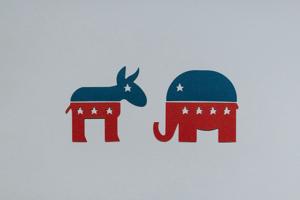By Stephen Beech Conservatives may rate their mental health more positively than liberals because of perceived stigma around the subject, suggests new research. Politically right-leaning people self-rate as having better “mental health” due to negative attitudes around the term, say scientists. When conservatives rated “mood” instead of “mental health,” researchers found that ideological gaps in ratings disappeared.
A number of previous studies in the United States found that conservatives rate themselves as being happier and having better mental health than their liberal counterparts. But it has remained unclear what causes such a "happiness gap." Researchers say the difference could be a product of the correlation between conservatism and traits associated with mental health such as religious faith, patriotism, marriage, higher incomes, and old age.

But it could alternatively reflect differing ideas about the state of the world, or different attitudes to the concept of mental health. To better understand the size and cause of the happiness gap, Professor Brian Schaffner, of the Department of Political Science at Tufts University, Massachusetts, and his colleagues used a representative survey of 60,000 American adults from the 2022 Cooperative Election Study survey. Participants were asked about their mental health, their political ideology, and their demographics - including age, home ownership and marital status.
In the 2023 Cooperative Election Study survey, the research team surveyed 1,000 American adults. Half were asked the same 2022 questions, while the other half were asked to rate their “mood” as opposed to their mental health. In the 2022 survey, conservatives rated themselves on average 19 points higher for mental health than liberals.
Once positive mental health traits such as age, marital status, and church attendance were accounted for, the gap reduced by 40%, to 11 points. In the 2023 survey, when respondents were asked to rate their “overall mood” instead of their “mental health,” the remaining differences disappeared. The findings, published in the journal PLOS One , showed 64% of highly positive ratings of “mental health” for conservatives dropped to 49% for “overall mood.
” But while 29% of liberals rated their “mental health” as fair or poor, only 17% rated their “overall mood” the same way. The researchers suggest that stigma for conservatives around the phrase “mental health” might contribute to the gap, while the negative mental health ratings by liberals might reflect increased awareness of mental health issues. The happiness gap, the authors note, may be dependent on which term is used to measure it.
Dr. Schaffner said: “There has been a lot of discussion about the notion that Conservatives are happier and have better mental well-being than Liberals, but we wanted to really test how true this is. "What our experiment shows is that it really depends what you ask about.
"Yes, Conservatives report that their mental health is better than Liberals do, but that gap disappears entirely when we ask instead about each group's overall mood. "The ideological gap in mental well-being is clearly not as straightforward or consistent as it is often made out to be.” He added: “The idea for this project came from discussions with three student co-authors who had been exposed to this claim that conservatives are happier than liberals in another class that they were taking at the time.
"We wanted to test how true that pattern was and what we ended up finding was that the ideological gap in mental well-being is not nearly as clear cut as it is often made out to be.”.
Health

Why conservatives say they have better mental health than liberals

Previous studies found that conservatives rate themselves as being happier than their liberal counterparts.















